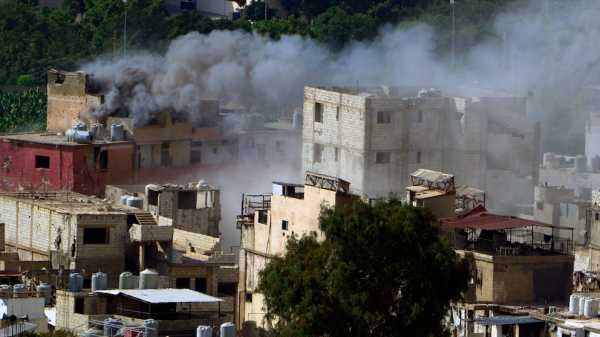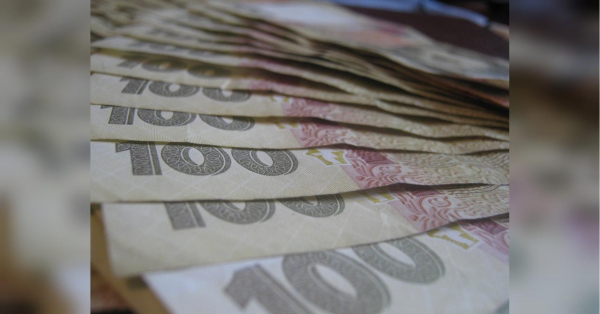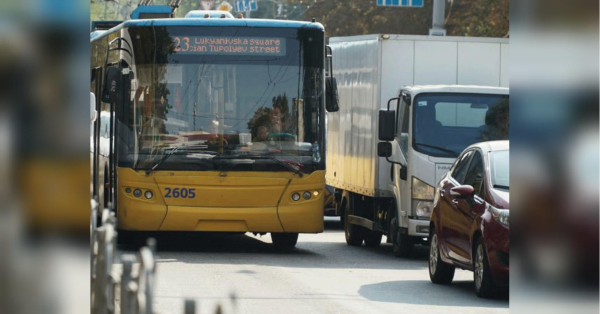
SIDON, Lebanon — An “immediate and lasting cease-fire” was declared Monday after a top Lebanese general met with officials from rival Palestinian factions, following days of fighting in Lebanon’s largest Palestinian refugee camp, which left several people dead and dozens wounded.
The new ceasefire failed to halt the fighting, however, residents and officials in the camp said in the hours after the agreement was announced. It was the latest in a series of cease-fires that only lasted for hours before fighting erupted again.
The announcement was made in Beirut by the General Security Directorate.
Gunfire and explosions were heard throughout the day inside the Ein el-Hilweh refugee camp, claiming the life of at least one person. Stray bullets and shells hit residential areas in the country's third-largest city.
The fighting that broke out Thursday night after nearly a month of calm in Ein el-Hilweh refugee camp near the port city of Sidon between Palestinian President Mahmoud Abbas’ Fatah group and militant Islamist groups has left six people dead and more than 50 wounded according to medical officials and state media.
The U.N. agency for Palestinian refugees, UNRWA, shared its own tally on Sunday saying four people were killed and 60 others wounded.
Clashes erupted as Fatah and other allied militant factions in the camp had intended to crack down on suspects accused of killing Fatah military general, Abu Ashraf al Armoushi, in the camp in late July.
One of the men suspected of being involved in Armoushi’s killing, Izzedine Abu Dawoud, was critically wounded Monday inside the camp and rushed to hospital where doctors announced him as “clinically dead,” Lebanese security officials said. The officials spoke on condition of anonymity in line with regulations.
Lebanese security officials and members of Fatah said they do not expect a permanent halt to the clashes in the immediate future, despite the new ceasefire.
Elias Farhat, a retired Lebanese army general who is now a researcher of military affairs, said no ceasefire will hold unless the suspects in Armoushi's killing are handed over to Lebanese authorities for prosecution as demanded by a committee of Palestinian factions in the camp.
While some have called for the Lebanese army to intervene, Lebanese security forces generally do not enter the Palestinian camps, and Farhat said there has been “no political decision” to do so now.
Stray bullets hit the municipality building in Sidon damaging windows without hurting anyone, the state-run National News Agency said.
The public Lebanese University was closed and the Lebanese Army closed off the main highway that links Beirut with southern Lebanon near the camp and traffic was directed toward a coastal road due to the fighting.
“The city is suffering. The civilians in the camp are suffering,” Lebanese legislator who represents Sidon Abdul-Rahman Bizri said in an interview with The Associated Press. He added that the fighting may continue for the coming days with “no clear winner or loser … because the balance of power in the camp is very difficult and delicate.”
The Lebanese military said Sunday night that five soldiers were wounded after three shells hit an army checkpoint surrounding the camp, with one in a critical condition.
“We will not stand idle with what is happening in Ein el-Hilweh,” warned Maj. Gen. Elias al-Baysari head of the General Security Directorate in an interview with a local newspaper published Monday. “The situation in the camp is unbearable,” he said.
Al-Baysari later Monday hosted a meeting at his office in Beirut that included officials from several Palestinian factions to discuss the possibility of a new truce. After the meeting ended, the cease-fire was declared as well as a call to hand over the suspects in Armoushi’s killing to Lebanese authorities. The statement by General Security Directorate gave no further details.
Two of the combatting groups Sunday said they would abide by a cease-fire, though Fatah did not officially respond to those claims. It was unclear if a decision was reached during the meeting.
Ein el-Hilweh — home to some 55,000 people according to the United Nations — is notorious for its lawlessness, and violence is not uncommon in the camp. It was established in 1948 to house Palestinians who were displaced when Israel was established.
UNRWA said hundreds of families displaced from the camp have taken shelter in nearby mosques, schools and the Sidon municipality building.
Earlier this summer, street battles in the Ein el-Hilweh between Fatah and members of the extremist Jund al-Sham group and Shabab al-Muslim lasted for several days, leaving 13 people dead and dozens wounded, and ended after an uneasy truce was put in place on Aug. 3. The fighting also forced hundreds to flee their homes.
Lebanon is home to tens of thousands of Palestinian refugees and their descendants. Many live in the 12 refugee camps that are scattered around the small Mediterranean country.
___
Associated Press writera Bassem Mroue in Beirut and Abby Sewell in Irbil, Iraq, contributed to this report.
Sourse: abcnews.go.com






